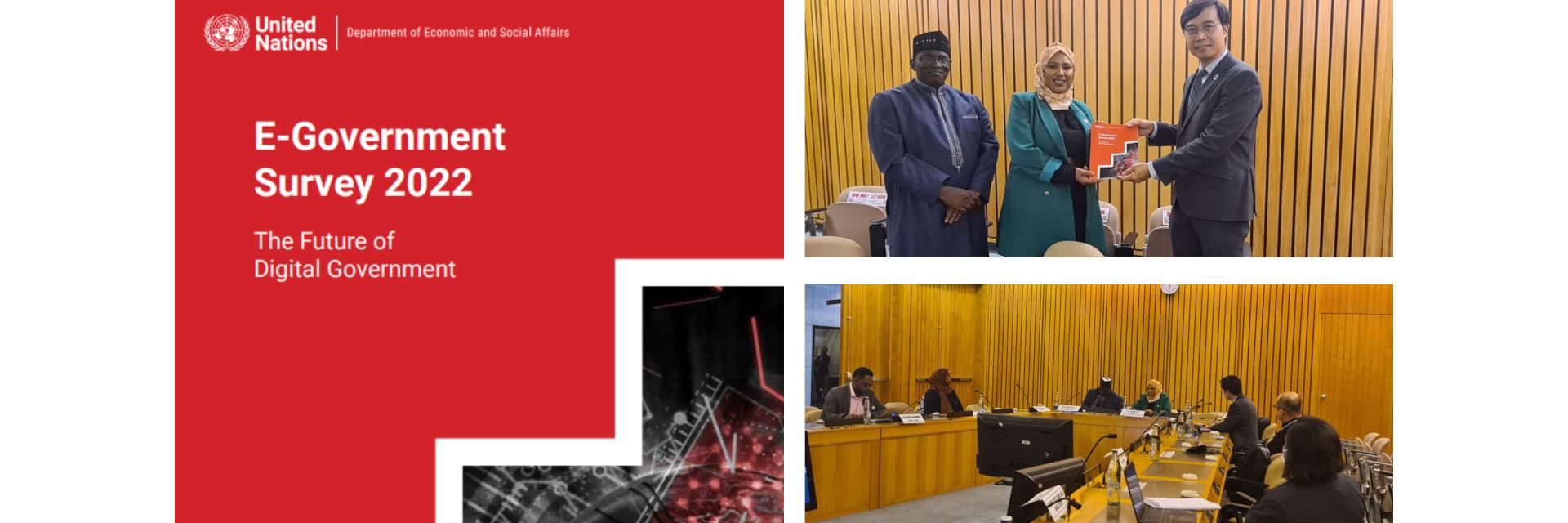Addis Ababa, 14 October 2022 – Despite multiple crises of the past two years, countries and municipalities have remained committed to pursuing digital government strategies — many implemented specifically to address the impacts of the COVID-19 pandemic. Yet, many have fallen short in providing adequate online services, according to the 2022 edition of the United Nations E-Government Survey – The Future of Digital Government.
South Africa, Mauritius, Seychelles, and Tunisia lead the 2022 digital government ranking in Africa, scoring the highest when it comes to the scope and quality of online services, the status of telecommunication infrastructure, and existing human capacity. Runners-up are Morocco, Egypt, Ghana, Cabo Verde, Algeria, Kenya, Gabon, Botswana, Rwanda, Cote d’Ivoire, Namibia, and Zambia – out of which three countries have moved to the high “E-Government Development Index” (EGDI) group for the first time (Côte d’Ivoire, Rwanda, and Zambia).
While the data shows general increases in online services for vulnerable groups, evidence of pervasive digital divides is stark. All of the countries with the lowest EGDI rankings are those in special and developing situations. A range of human-centered issues related to access, affordability, general abilities, digital literacy, and language are explored in the 2022 Survey.
Digitalization trends in Africa are positive overall. Fixed (wired) broadband subscriptions have jumped 48 per cent since 2020, rising from 1.80 to 2.67 per 100 inhabitants. Nevertheless, the values for these indicators remain below the corresponding global averages, and the cost of mobile broadband subscriptions as a percentage of gross national income per capita remains significantly higher in Africa than in other parts of the world, contributing to the digital divide.
Africa faces persistent challenges linked to inadequate investment in e-government development. Low-income and lower-middle-income countries make up 85 percent of the regional total, and two thirds of these countries are LDCs, LLDCs, and/or SIDS. Africa is home to 39 of the 91 countries in special situations worldwide. The lowest EGDI and subindex values are found among the LDCs, including those that are also LLDCs and SIDS; the average EGDI value for this group is 0.3233.
Consistent with its mandate through several initiatives, The United Nations Economic Commission for Africa (ECA) is building momentum toward promoting an interdisciplinary approach to innovation, learning, and skills development that will make AfCFTA fully operational. In line with this, ECA has co-led with the African Union the development of the continental Digital Transformation Strategy 2020-2030 with a key sectoral strategy supportive of the continental development focus.
Further in facilitating the strategy, ECA has been working with African member states to support several digital transformation initiatives, from policymaking, and resource mobilization, to infrastructure development. In parallel, ECA also works towards advancing key regional priorities supportive of digital transformation such as the interoperability and trust frameworks for Good Digital ID systems, digital payment systems, applied research and development in Artificial Intelligence, privacy and data protection laws, cybersecurity, and data governance frameworks for the data economy among others. Additionally, ECA supports skills development in the continent by organizing ICT-related training, such as coding camps targeting girls, young women, and people living with disabilities.
In reflection to the survey’s key disclosure and findings, Mr. Jean Paul Adam, Director for the Technology, Climate Change and Natural Resources Division at ECA said:
‘Digitalization trends in Africa are positive overall. Fixed (wired) broadband subscriptions have jumped 48 percent since 2020’. He added; ‘Nevertheless, the values for these indicators remain below the corresponding global averages, and the cost of mobile broadband subscriptions as a percentage of gross national income per capita remains significantly higher in Africa than in other parts of the world, contributing to the digital divide’.
The 2022 Survey shows that the future is hybrid and not digital --- but digital technologies allowed governments to play a key role in addressing the challenges surrounding the COVID-19 pandemic. Many African countries implemented digital measures, with a majority focusing on distance learning and vaccination services, and others also providing telehealth and online scheduling for medical tests. The proportion of countries offering all four types of services is 40 percent in Africa.
The 2022 Survey also continued its study of e-government development at the local level. Despite a digital performance gap between city portals and their national counterparts, most cities have improved their Local Online Service Index scores through greater access to important resources such as a highly skilled workforce, a broad knowledge and skill base, and a dedicated public budget.
The 2022 Survey calls on Governments to strategize and invest more in long-term national digital transformation plans. Meaningful connectivity must be guaranteed for all to help prepare for future crises and shocks. Advances in technology and e-government must ultimately serve the wider goal of supporting sustainable human development—and leaving no one behind.
About the United Nations E-Government Survey
The United Nations E-Government Survey, published by the Department of Economic and Social Affairs, is prepared over a two-year period following an established methodology. It looks at how digital government can facilitate integrated policies and services across 193 UN Member States. The Survey supports countries’ efforts to provide effective, accountable, and inclusive digital services to all, bridge the digital divide and leave no one behind. In the report of the Secretary-General’s High-level Panel on Digital Cooperation, the E-Government Survey is recognized as a key ranking, mapping, and measuring tool, supporting the digital transformation of countries.
Following the global launch of the 2022 Survey on 28 September, webinars and regional information sessions will be held to share further insights and key findings at the global, regional, and local levels. The Survey will be made available in Arabic, Chinese, English, French, Russian, and Spanish, thanks to the collaboration with external partners.
Download the Full Report here: https://publicadministration.un.org/en/Research/UN-e-Government-Surveys
Media contacts:
Wai Min Kwok, kwok@un.org
United Nations Department of Economic and Social Affairs (UNDESA)
Mactar Seck, seck8@un.org
United Nations Economic Commission for Africa (UNECA)

